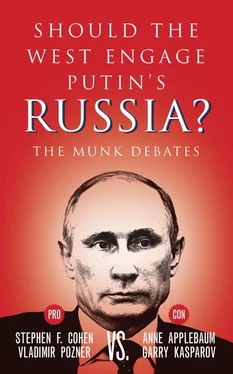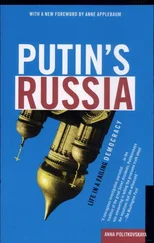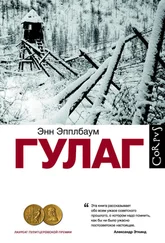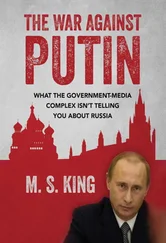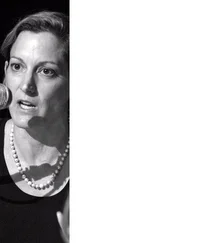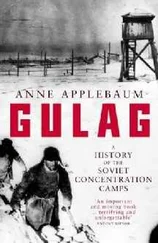RUDYARD GRIFFITHS
RUDYARD GRIFFITHS: Speaking against the motion tonight is Garry Kasparov, well known in the world of chess. More importantly, this is a man who has acted as a dissident in his own country of Russia. He has helped lead a political opposition, both in Russia and abroad, to the regime of Vladimir Putin. He is the chair of the Human Rights Foundation, among his many accolades and hats that he wears today. Garry, great to have you in Toronto.
GARRY KASPAROV: Thanks for inviting me.
RUDYARD GRIFFITHS: Tell us, what is the mood in Russia like? How are average Russians looking at what we are going to debate this evening in Toronto? If this debate were going to take place in downtown Moscow, how would that conversation unfold?
GARRY KASPAROV: If this debate had the chance of taking place in downtown Moscow, I have a feeling my countrymen would act very differently. Russia didn’t have any meaningful debates for many years. Russia doesn’t have live television, so everything is pre-recorded. The very idea of debate could change a lot. Because today, average Russians are swarmed by this 24/7 propaganda that has been seeding hatred for every neighbour of Russia, for the rest of the world, and has created an image of Vladimir Putin as the saviour of Russia from endless enemies.
RUDYARD GRIFFITHS: Are you concerned that by being so critical of Putin — critical of the current Russian regime — you are playing into that propaganda? You are, in a sense, exhibit A for the negative critique of Russia abroad, to the degree that Russia isn’t being respected or acknowledged as a proper global power.
GARRY KASPAROV: Look, I have been advocating for the West’s engagement with Russia, which is my country, but I believe that Putin’s regime is the greatest enemy for the future of Russia. And I am fighting Putin’s regime. I don’t feel very comfortable arguing against engagement and for isolation today. For me, it’s more about appeasement versus containment. Putin’s regime is a virus and you don’t engage a virus. Russia threatens every neighbouring country. But also by his brazen actions in Crimea, Ukraine, and Georgia, Putin has created a very different international atmosphere, one that could jeopardize the entire global order.
RUDYARD GRIFFITHS: Your opponents tonight are probably going to bring up some examples where Russians have been constructive. They have been productive as part of the P5+1 in terms of negotiations with Iran, offering to take the enriched uranium from Iran to Russia and control its release back to Iran. Let’s face it; they got Obama out of some hot water in Syria over his red line and chemical weapons.
How do you synch those examples of Russia acting in a broader interest? Or maybe you don’t think they have been, with your staunch critique of Mr. Putin and his regime?
GARRY KASPAROV: The two cases that you mentioned definitely play straight into Putin’s hands, because a dictator’s logic is different from the logic of a democratic president or prime minister. It is all about surviving. They pursue activities that allow them to maintain their grip on power.
Russia was delighted to play this pivotal role in negotiations with Iran. By the way, the negotiation was endless and it helped to maintain the tension in the Middle East, and to keep oil prices quite high. But also, Russia is indispensable now. So that is another bargaining chip for Putin.
Now, as for Syria, Putin always wanted Bashar al-Assad to survive because a new government in Syria could potentially mean that parts of Iraq could become very unstable. The gas from the Gulf could ultimately go to Europe, which would jeopardize Putin’s grip on power via the pipeline. With a Russian gas supply, he can hold Europeans hostage.
RUDYARD GRIFFITHS: Do you think low energy prices globally are going to be the best solution to bringing Putin’s regime to heel, forcing it to compromise and engage? Or do you think he has a strategy that is going to allow him to dodge that issue?
GARRY KASPAROV: The low energy prices definitely help to curb the dangerous ambitions of Putin’s regime. But let’s not forget it’s a one-man dictatorship. This is not a regime that will be looking for compromise. So that is why we should look for a more combined approach to make sure that people surrounding Putin, including the Russian bureaucracy and middle class, recognize the evils of Putin’s rule. That is our best hope. Moreover, it could strengthen the very existence of humanity, because unlike dictators of the past, Putin has his fingertips on the nuclear button.
RUDYARD GRIFFITHS: But is what comes after Putin worse? Should we be careful what we wish for?
GARRY KASPAROV: Putin has been in power for so long that he has succeeded in eliminating decent opposition. In order to stay in power, he has eliminated elections, public debate, and all democratic procedures. He has definitely created an atmosphere that is quite alien to democracy. But the problem is that every day he stays in power, he makes the outcome for the future worse. I wish I could tell you that if Putin left today Russia would be a democracy, but that would be a mistake. And I wouldn’t be honest with myself.
If he stays in power one more year, there will be more blood. There will be more tragic events, and eventually there will be less of a chance for Russia to remain in one piece as a state within its current borders, and to recover.
RUDYARD GRIFFITHS: Another thing that is sure to come up tonight is the whole question of NATO’s involvement in this crisis, both as a potential bulwark against any tendency Putin might have to expand his ambitions beyond Ukraine and the Baltic States, but also — as Stephen F. Cohen and Vladimir Pozner will likely say — in the sense that we brought this upon ourselves. We didn’t treat Russia with respect after the collapse of the Soviet Union. We deployed NATO troops right up to the Russian homeland, and all of this is a reaction to our provocation.
GARRY KASPAROV: There is a difference between invading other countries and understanding the intentions of your potential enemies. This argument falls flat because it means that we do not believe that a hundred million eastern Europeans have the right to decide how they should build their lives or determine what kind of political or economic affiliations they would like to see for their countries. I think that goes against the mentality of the twenty-first century. We are not living in the nineteenth or twentieth centuries. Also, when we look at the facts, NATO expansion was very much on paper. By the year 2013, there was not a single American tank unit in Europe. How can you invade anybody with no tanks?
We also understand the history and read about it in books, but for Baltic nations and Estonians, this is not merely the past — it’s a reality. The Baltic nations were always suspicious of Russia, so we have to give them credit. They had rights and a genetic fear of a potential Russian invasion. And unfortunately, Putin’s actions have created a lot of unease. They don’t forget the invasion of Georgia.
And look at Ukraine. Only about 15 to 17 percent of the country’s citizens were NATO sympathizers, mainly people living in the western part. Ukraine and Georgia were flatly denied NATO membership in 2009. Today, you have two-thirds or more of Ukrainians supporting NATO membership. Why? Because they saw what could happen if their country remains defenceless against a powerful neighbour.
RUDYARD GRIFFITHS: Your opponents tonight will probably use Kosovo as an example to respond to Georgia and say, Look, NATO forced the partition of Serbia, and the independence of Kosovo through the bombing of Serbia. Why did NATO get to do that, led by the United States, whereas Russia doesn’t get to do the same in Crimea?
Читать дальше
